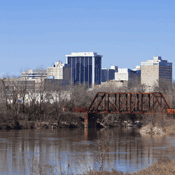The Joint Legislative Committee on Performance Evaluation and Expenditure Review is warning against the likelihood of the Rankin-Hinds Pearl River Flood and Drainage Control District Levee Board funding a lake or similar impoundment for flood control in the Pearl River.
A PEER report determined that progress on actually nailing down some means of flood control—be it a levee expansion, a container lake or a combination of both—was too slow. Noting delays, it also recommended the Levee Board deliver to the state House and Senate, as well as to PEER, an annual report of its progress by Dec. 31. PEER has offered similar suggestions in the past, but it usually reserves annual report requests to state agencies—even though PEER said in the report that it defines the district as having "more in common with the political subdivisions of local government than a state agency."
The report stated that the Levee Board has considered multiple plans to avoid another 1979 Easter Flood, including a massive "Two Lakes" plan impacting more than 7,000 acres of wetland and woodland area, and a more recent one lake plan that floods only the channelized portion of the Pearl River, south of Lakeland Drive.
PEER declared that the Levee Board's more recent endorsement of a one-lake plan is an improvement over the earlier lake plan, saying that the bigger lake plan "appears to exceed financial feasibility." Aside from the impractical litigation costs of inundating precious wetland, PEER also noted that the district appears to have "no apparent definable plan to finance the construction" of the larger lake project, and that "the apparent absence of the authority of eminent domain weakens the ability of a private entity to obtain the land necessary to construct such a massive project."
The state investigative agency notes that financing any flood-control project will not come easy. The Corps has shown willingness to move forward on a simple levee expansion, but PEER cites that the state Legislature twice failed to help fund the local share of the project which was only $38 million.
Part of the roadblock consisted of representatives further downstream who feared the expanded bottleneck of the larger levee would increase the flow of floodwater to their area. PEER reported that an amendment to one of the bills financing the local share in 1995 "required the persons responsible for paying all bonds authorized for levee construction to also be responsible for bonding funds necessary to repair damages caused by increased flooding south of the Jackson area."
Money issues will continue to plague whatever plan the Levee Board endorses. Waggoner Engineering owner Joe Waggoner suggested the board recess Oct. 11 while his company gathered information on what the district would need to do to fund the local share of any flood-control development.
The district would likely have to expand and fund any development with a property-tax increase, but most of the board members serve as mayors of various cities surrounding the Pearl River, and step gingerly around the idea of property-tax increases to their voters.
Waggoner did not broach the topic of the tax increase or the district expansion at the Oct. 27 meeting, however, and the mayors on the board did not inquire that day as to why.



Comments
Use the comment form below to begin a discussion about this content.
comments powered by Disqus